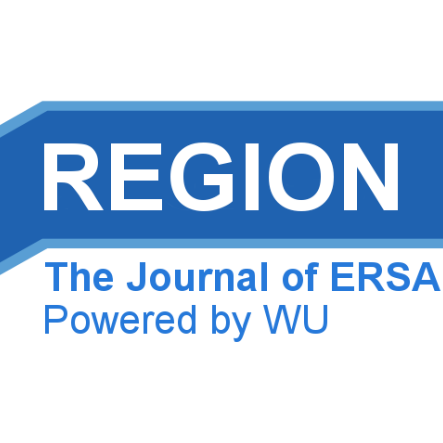Agglomeration effects on labor productivity: An assessment with microdata
DOI:
https://doi.org/10.18335/region.v2i1.24Keywords:
agglomeration externalities, Knowledge Spillover, Labor Productivity, Firm LevelAbstract
Urbanization and localization effects are known to boost the regional economy and its growth potential. The emergence of these effects is due to localized knowledge flows, the closeness to markets, but also due to the diversity of services and industries. All these effects have the potential to increase the productivity (and profitability) of firms. Whereas many studies have been conducted at the industry or the regional level, this paper adds to the existing literature by starting at the level of establishments and taking the interaction with the surrounding regions into account. This is possible by exploiting an exceptionally large establishment panel study and the employment statistics for Germany. The empirical analyses are carried out in two steps regressions in order to separate the characteristics of establishments from regional influences.Published
How to Cite
Issue
Section
License
REGION is an open journal, and uses the standard Creative Commons license: Copyright We want authors to retain the maximum control over their work consistent with the first goal. For this reason, authors who publish in REGION will release their articles under the Creative Commons Attribution license. This license allows anyone to copy and distribute the article provided that appropriate attribution is given to REGION and the authors. For details of the rights authors grant users of their work, see the "human-readable summary" of the license, with a link to the full license. (Note that "you" refers to a user, not an author, in the summary.) Upon submission, the authors agree that the following three items are true: 1) The manuscript named above: a) represents valid work and neither it nor any other that I have written with substantially similar content has been published before in any form except as a preprint, b) is not concurrently submitted to another publication, and c) does not infringe anyone’s copyright. The Author(s) holds ERSA, WU, REGION, and the Editors of REGION harmless against all copyright claims. d) I have, or a coauthor has, had sufficient access to the data to verify the manuscript’s scientific integrity. 2) If asked, I will provide or fully cooperate in providing the data on which the manuscript is based so the editors or their assignees can examine it (where possible) 3) For papers with more than one author, I as the submitter have the permission of the coauthors to submit this work, and all authors agree that the corresponding author will be the main correspondent with the editorial office, and review the edited manuscript and proof. If there is only one author, I will be the corresponding author and agree to handle these responsibilities.





